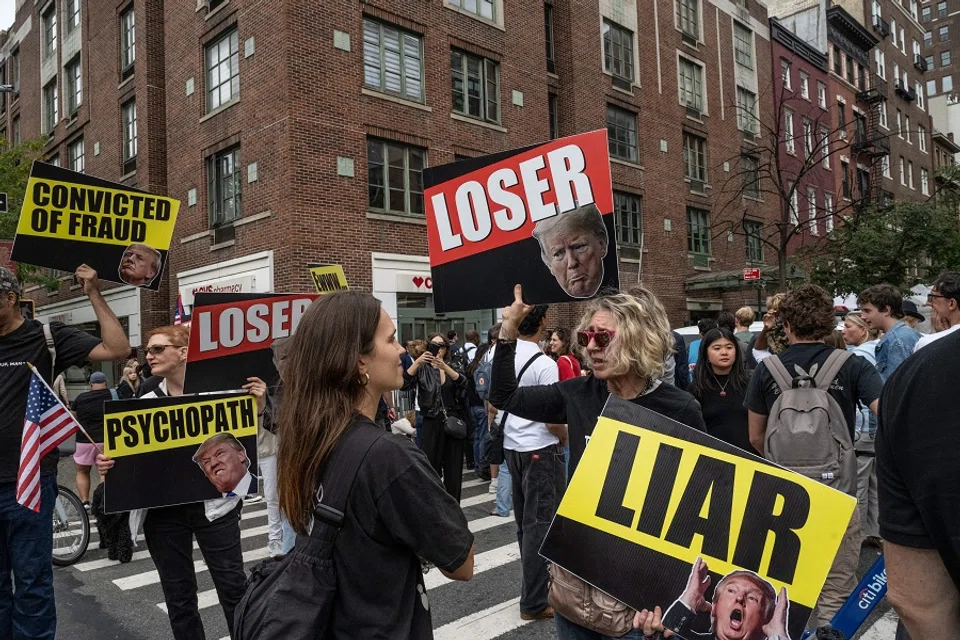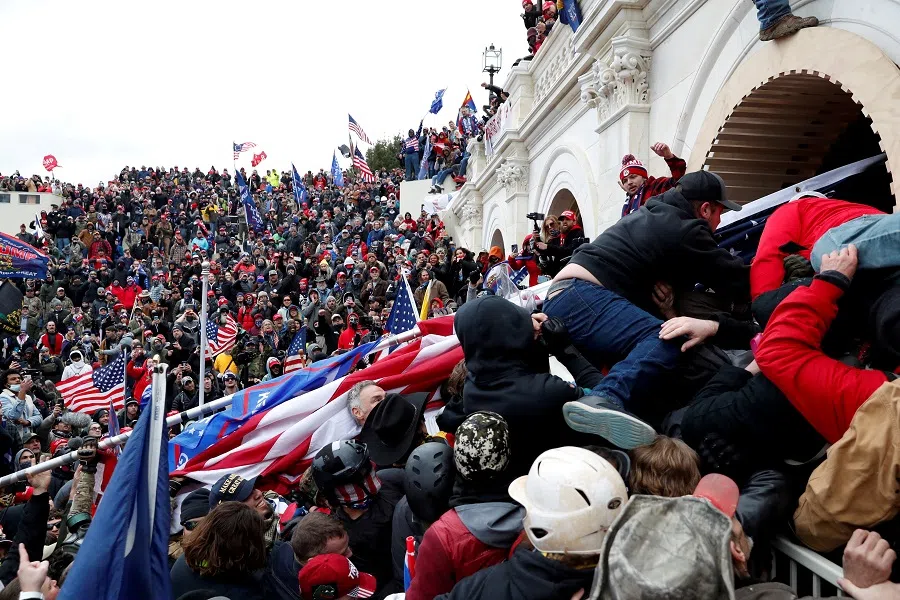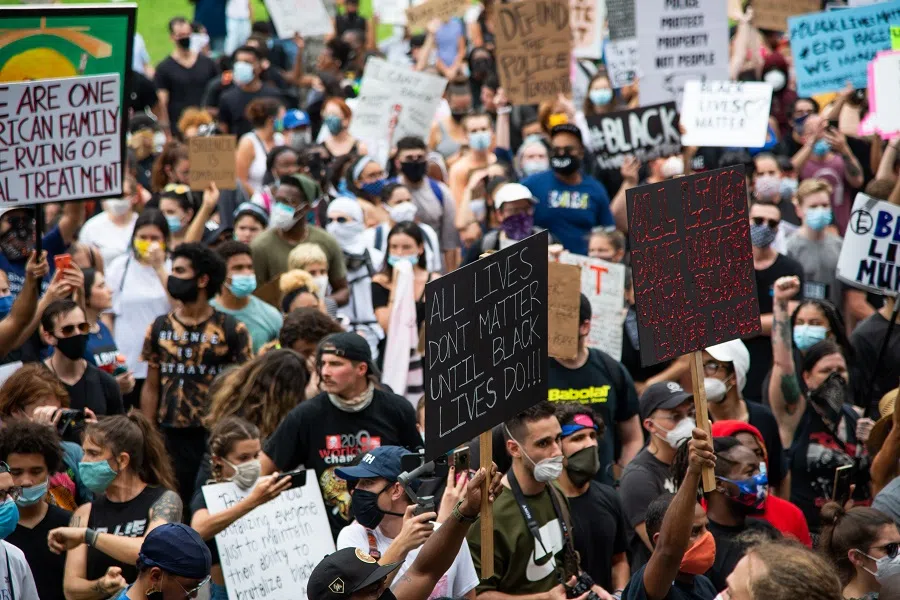Political violence and the future of the US
Commentator Jin Jian Guo notes that while the US is known for its democracy and rule of law, one stubborn problem that it still has not resolved is political violence. What will it take to get people to dial down the vitriol?

The US is a great country, but one with its dark and dirty side — political violence is a blight on American society. From the moment the Anglo-Saxons set foot in North America, the new immigrants used violence as a weapon to conquer the natives.
Rooted in violence?
Violence was also a necessary tactic in the victory of industrial civilisation over the plantation economy of the South during the American Civil War; it was a necessary force in America’s path to hegemony, as it seized Mexican territory and defeated Spain. As Thomas Jefferson famously wrote: “The tree of liberty must be refreshed from time to time with the blood of patriots and tyrants.”
Moving into the 20th century, America went through several waves of violent populism. With the mass immigration of Catholics, millions signed up to the nationalist movement and the white supremacist Ku Klux Klan (KKK). The KKK and its allies went on to carry out numerous attacks on blacks, Jews and Catholics.
In the 1960s and 1970s, Americans were forced to deal with major political assassinations and large-scale urban riots. In the 1980s and 1990s, and the first decade of the 2000s, the US also saw a number of domestic terrorist attacks, the most infamous being the Oklahoma City bombing in 1995.
The Second Amendment provides objective conditions for individuals to engage in violence, while political polarisation gives impetus to the use of violence, so that political violence has become the norm. This is an embarrassment to American democracy and the rule of law.
Former president Donald Trump has been the target of two failed assassinations to date, becoming himself the victim of political violence, which can also be linked to the storming of the Capitol on 6 January 2021. His slowness in urging his supporters to leave the Capitol shows his stance on political violence.
Going by the description of both presidential candidates, the would-be president entering the White House in 2025 will be either a Marxist, or a liar, thug and lunatic.

Trump has frequently used malicious language to attack his opponents during the presidential race, and has often described Joe Biden as a “fascist”. He also called Vice-President Kamala Harris a “radical left Marxist”, and described her as “crazy”.
On their part, the Democrats have also used extreme language to hit out at Trump. Harris has apparently said something along these lines: “I am about to debate a liar, a thug, a lunatic, a sexual predator, a tax cheat and a narcissist, never before seen in US history.”
Political extremism is the breeding ground of political violence
Going by the description of both presidential candidates, the would-be president entering the White House in 2025 will be either a Marxist, or a liar, thug and lunatic. Logically, differences in political ideology and policy objectives make for a healthy democracy, but the polarisation of ideology, policy positions and sentiment in the US has become so confrontational, it is the most serious among similar democracies.
Political extremism is the breeding ground of political violence. When self-identity leads to political differences, there is more likely to be political violence. When people find themselves on opposite sides of racial, ethnic or religious divides, they are more likely to regard political opponents as enemies. Gun owners might naturally get the idea of eliminating their enemies with their weapons. Several US presidents have faced assassination attempts, and four have died.
Many political scientists have defined the state as an entity that holds a monopoly on the legitimate right to use force within a territory. By this definition, when the state uses disproportionate force on its people, whether through repressive legislation or police brutality, it would prompt extremists to be driven to violence to resist the state apparatus.
When members of the public lose their rights and feel they have become victims to some extent, they will also resort to violence against the state. State violence and political violence by the people often feed off each other.

When members of the public lose their rights and feel they have become victims to some extent, they will also resort to violence against the state. State violence and political violence by the people often feed off each other. The death of George Floyd, a black man, under the knee of a white police officer triggered the Black Lives Matter movement that set off a “culture revolution” in America.
The most important factor in triggering political violence in the US is political party leaders. After the assassination attempt on Trump in July this year, both Democrats and Republicans called for dialling down the use of inflammatory rhetoric. However, Republicans said Democrats were largely responsible for the assassination attempt.
But the truth is that the right wing in the US is responsible for political violence. In the 1970s, incidents of political violence were largely linked to the left wing. But since the 1990s, the radical right have committed far more ideologically motivated murders than the leftist extremists or Islamic extremists.
Trump and Harris have not shown strong desire to resolve political violence; what stands out in the campaigning is that they are completely smearing their opponent.
The responsibility of solving the problem of political violence in the US lies with the leaders of both parties, and depends on whether they sincerely want to resolve the issue. If they continue to use malicious and hostile language to attack opponents during the election campaign, that would show a lack of sincerity to end political violence, because political rhetoric can create an environment that tolerates or even encourages violence.
Trump and Harris have not shown strong desire to resolve political violence; what stands out in the campaigning is that they are completely smearing their opponent. Such politicians who put gaining presidential power over national interest will not be able to bring down political violence even if they do become president.
This is the tragedy of American democracy and rule of law. An extremely wealthy and innovative nation seems unable to innovate solutions for resolving the stubborn issue of political violence, and cannot reach a simple or fair way to mediate between the visions of the conservatives and the liberals. For the US, the road ahead is a rough one full of conflict.
This article was first published in Lianhe Zaobao as “政治暴力是美国阴暗面的顽疾”.





